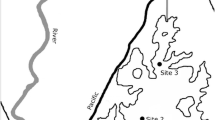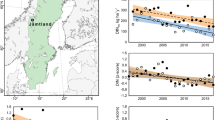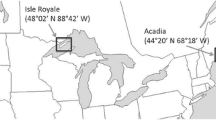Abstract
The increase in human development in the downstream portion of the Pyramid Lake drainage basin has resulted in increased nutrient loading to the lake. Since this is a deep, terminal lake, concern over nutrient build up and change in trophic status exists. On the basis of lake chemistry which shows consistently high concentrations of total reactive-P (mean = 55 µg P l−1) relative to dissolved inorganic-N (DIN) (mean = 15 µg N 1−1), it has been hypothesized that Pyramid is N-limited. However, no systematic study of nutrient limitation had been undertaken. Nutrient enrichment bioassays conducted throughout an entire year clearly showed that additions of DIN resulted in a 350–600% stimulation of chlorophyll production. Phosphate, when added singly or in combination with DIN, had no effect. This positive response to N-addition was significant at all times of the year except, (1) immediately after complete lake mixing in February when a large pool of hypolimnetic nitrate was injected into the euphotic zone, and (2) during a fall bloom of the nitrogen fixing species Nodularia spumigena. The positive response to N-addition in the bioassay experiments was strong between March and November. However, the seston exhibited only a gradual depletion of nitrogen relative to carbon over this same period. PN:PC ratios suggested no N-deficiency in phytoplankton biomass in February, March and April, moderate N-deficiency in May, June and July and, severe N-deficiency from August until winter turnover. The appearance of nitrogen fixing blue-green algae in September supports the hypothesis of N-limitation in the summer-autumn. In evaluating the nutrient status of a lake, the concepts of nutrient stimulation versus nutrient deficiency versus nutrient limitation must clearly be defined.
Similar content being viewed by others
References
APHA, 1985. Standard methods for the examination of water and wastewater. 17th edn. American Public Health Association, N.Y.
Axler, R. P., P. M. Gersberg & C. R. Goldman, 1982. Inorganic nitrogen assimilation in a subalpine oligotrophic lake. Limnol. Oceanogr. 27: 53–65.
Cooper, J. S., Vigg, R. W. Bryce & R. L. Jacobson, 1983. Limnology of Lahontan Reservoir, 1980–1981. Desert Research Institute, Univ. Nevada, Reno. Publication # 50021.
Cullen, P. & I. Smalls, 1981. Eutrophication in semi-arid area — the Australian experience. Water Qual. Bull. 6: 79–83, 90–91.
Dugdale, R. C. & J. J. Goering, 1967. Uptake of new and regenerated forms of nitrogen in primary productivity. Limnol. Oceanogr. 12: 196–206.
Edmondson, W. T., 1972. Nutrients and phytoplankton in Lake Washington. Limnol. Oceanogr. Special Symp. Vol. I, pp. 172–193.
Edmondson, W. T. & J. L. Lehman, 1981. The effect of changes in the nutrient income on the conditions of Lake Washington. Limnol. Oceanogr. 26: 1–29.
Elser, J. J., E. R. Marzolf & C. R. Goldman, 1990. Phosphorus and nitrogen limitation of phytoplankton growth in the freshwaters of North America: a review and critique of experimental enrichments. Can. J. Fish. aquat. Sci. 47: 1468–1477.
Flett, R. J., R. D. Hamilton & N. E. R. Campbell, 1976. Aquatic acetylene-reduction techniques: solutions to several problems. Can. J. Microbiol. 22: 43–51.
Galat, D. L., 1990. Seasonal and long-term trends in Truckee River nutrient concentrations and loads to Pyramid Lake, Nevada: A terminal saline lake. Wat. Res. 24: 1031–1040.
Galat, D. L., E. L. Lider, S. Vigg & S. R. Robertson, 1981. Limnology of a large, deep, North American terminal lake, Pyramid Lake, Nevada, USA. Hydrobiol. 82: 281–317.
Galat, D. L. & J. P. Verdin, 1988. Magnitude of blue-green algal blooms in a saline desert lake evaluated by remote sensing: evidence for nitrogen control. Can. J. Fish. aquat. Sci. 45: 1959–1967.
Galat, D. L., J. P. Verdin & L. L. Sims, 1990. Large-scale patterns of Nodularia spumigena blooms in Pyramid Lake, Nevada, determined from Landsat imagery: 1972–1986. Hydrobiol. 197: 147–164.
Goldman, C. R., 1960. Primary productivity and limiting factors in three lakes of the Alaska Peninsula. Ecol. Monogr. 30: 207–270.
Goldman, C. R., 1963. The measurement of primary productivity and limiting factors in freshwater with Carbon-14. In M. S. Doty (ed.), Conference on Primary Productivity. U.S. Atomic Energy Commission. TID-7633.
Goldman, C. R., 1978. The use of natural phytoplankton assemblages in bioassay. Mitt. int. Ver. Limnol. 21: 364–371.
Goldman, C. R., 1981. Lake Tahoe: two decades of change in a nitrogen-deficient oligotrophic lake. Verh. int. Ver. Limnol. 21: 45–70.
Goldman, C. R. & A. J. Horne, 1983. Limnology. McGraw Hill Book Publishers, 464 pp.
Hamilton-Galat, K. & D. L. Galat, 1983. Seasonal variation of nutrients, organic carbon, ATP, and microbial standing crops in a vertical profile of Pyramid lake, Nevada. Hydrobiol. 105: 27–43.
Hardy, R. W., R. F. D. Holsten, E. K. Jackson & R. C. Burns, 1968. The acetylene-ethylene assay for nitrogen fixation: laboratory and field evaluations. Plant Physiol. 43: 1185–1207.
Harrison, W. G., 1978. Experimental measurements of nitrogen remineralization in coastal waters. Limnol. Oceanogr. 43: 684–694.
Healey, F. P., 1975. Physiological indicators of nutrient deficiency in algae. Fish. Mar. Serv. Tech. Rep. 585: 30 p.
Healey, F. P. & L. L. Hendzel, 1980. Physiological indicators of nutrient deficiency in lake phytoplankton. Can. J. Fish. aquat. Sci. 37: 442–453.
Hecky, R. E. & P. Kilham, 1988. Nutrient limitation of phytoplankton in freshwater and marine environments: A review of recent evidence on the effects of enrichment. Limnol. Oceanogr. 33: 796–822.
Horne, A. J. & D. L. Galat, 1985. Nitrogen fixation in an oligotrophic, saline desert lake: Pyramid Lake, Nevada. Limnol. Oceanogr. 30: 1229–1239.
Hutchinson, G. E., 1937. A contribution to the limnology of arid regions. Trans. Connecticut Acad. Sci. 33: 47–132.
Jellison, R. & J. M. Melack, 1988. Photosynthetic activity of phytoplankton and its relation to environmental factors in hypersaline Mono Lake, California. Hydrobiol. 158: 69–88.
Johnson, D. L., 1971. Simultaneous determination of arsenate and phosphate in natural waters. Envir. Sci. Technol. 5: 411–414.
Jones, M. N., 1984. Nitrate reduction by shaking with cadmium: an alternative to cadmium columns. Wat. Res. 18: 643–646.
Koch, D. L., S. Howell-Cooper, J. J. Cooper, S. Vigg, E. L. Lider & S. R. Robertson, 1984. Limnology of Topaz Lake, Nevada/California. Desert Research Institute, Univ Nevada, Reno. Publication # 5031.
Lebo, M. L., J. E. Reuter, C. L. Rhodes & C. R. Goldman, 1991. Limnological and nutrient cycling studies at Pyramid Lake, Nevada: October 1989–October 1990. Project Rept. Division of Environ. Studies, Univ. California, Davis, CA., 60 pp.
Liddicoat, M. I., S. Tibbits & E. I. Butler, 1975. The determination of ammonia in seawater. Limnol. Oceanogr. 20: 131–132.
National Eutrophication Survey (NES), 1977. Working Paper Series. U.S. Environmental Protection Agency, Corvallis, OR.
Rast, W. & G. F. Lee, 1978. Summary analysis of the North American (U.S. portion) OECD Eutrophication Project; Nutrient loading-lake response relationships and trophic state indices. U.S. Environ. Protection Agency Rept. EPA 600/3-78-008. 455 pp.
Redfield, A. C., 1958. The biological control of chemical factors in the environment. Am. Sci. 46: 205–221.
Reuter, J. E., H. Boriss, C. R. Goldman & J. J. Cooper, 1991. Analysis of water quality data for selected lakes and reservoirs in northern Nevada. State of Nevada, Division of Environmental Protection, Carson City, NV, USA.
Schindler, D. W., 1974. Eutrophication and recovery in experimental lakes: Implications for lake management. Science. 184: 897–899.
Schindler, D. W., 1977. Evolution of phosphorus limitation in lakes. Science. 195: 260–262.
Schindler, D. W., 1988. Experimental studies of chemical stressors on whole lake ecosystems. Verh. int. Ver. Limnol. 23: 11–41.
Smith, V. H., 1982. The nitrogen and phosphorus dependence of algal biomass in lakes: an empirical and theoretical analysis. Limnol. Oceanogr. 27: 1101–1112.
Solorzano, L., 1969. Determination of ammonia in natural waters by the phenolhypochlorite method. Limnol. Oceanogr. 14: 754–801.
Solorzano, L. & J. H. Sharp, 1980. Determination of total dissolved phosphorus and particulate phosphorus in natural waters. Limnol. Oceanogr. 25: 754–758.
Stewart, W. D. P., G. P. Fitzgerald & R. H. Burris, 1967. In situ studies on nitrogen fixation using the acetylene reduction technique. Proc. Nat. Acad. Sci. USA 58: 2071–2078.
Strickland, J. D. H. & T. R. Parsons, 1972. A practical handbook of seawater analysis. Bulletin 167. Fish. Res Board Can., Ottawa, Ontario, Canada.
Thornton, J. A. & W. Rast, 1989. Preliminary observations on nutrient enrichment of semiarid, manmade lakes in the northern and southern hemispheres. Lake and Reservoir Manag. 5: 59–66.
U.S. EPA, 1980. Draft Environmental Impact Statement: Reno/Sparks Joint Water Pollution Control Plant Master project. (EPA-9-CA-C-32-0114), U.S. EPA, Region 9, San Francisco, California.
Van Denurgh, A. S., R. D. Lamke & J. L. Hughes, 1973. A brief water resources appraisal of the Truckee River Basin, western Nevada. Wat. Resour.-Recon. Ser. Rep. 57. State of NV, Dept. of Cons. and Nat. Resour., Div. of Wat. Resour., Carson City, Nevada.
Vollenweider, R. A., 1968. Scientific fundamentals of the eutrophication of lakes and flowing waters, with particular reference to nitrogen and phosphorus as factors in eutrophication. Tech. Rept. No. DAS/CSJ/68.27. Organization for Economic Cooperation and Development, , Paris, 159 pp.
Vollenweider, R. A., 1976. Advances in defining critical loading levels for phosphorus in lake eutrophication. Mem. Ist. ital. Idrobiol. 33: 53–83.
West, N. E. & J. O. Klemmedson, 1978. Structural distributions of nitrogen in desert ecosystems. In N. E. West and J. Skujins (eds), Nitrogen in desert ecosystems. Dowden, Hutchinson and Ross, Stroudsburg, PA.: 1–16.
Wetzel, R. G., 1983. Limnology (2nd edn). Saunders College Publishing, Philadelphia, PA., 767 pp.
Author information
Authors and Affiliations
Additional information
This paper is dedicated to G. Evelyn Hutchinson who first visited Pyramid Lake in 1933.
Rights and permissions
About this article
Cite this article
Reuter, J.E., Rhodes, C.L., Lebo, M.E. et al. The importance of nitrogen in Pyramid Lake (Nevada, USA), a saline, desert lake. Hydrobiologia 267, 179–189 (1993). https://doi.org/10.1007/BF00018800
Issue Date:
DOI: https://doi.org/10.1007/BF00018800




